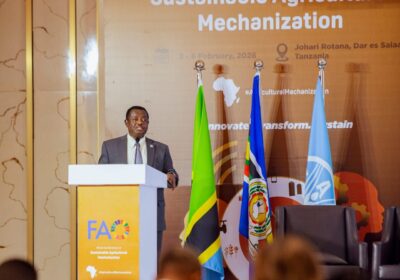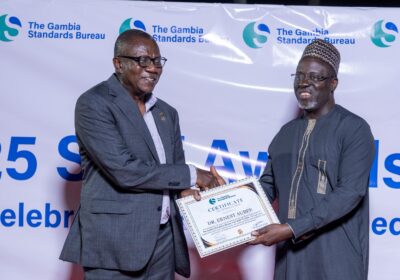ECOWAS Leaders Chart A new Path for Stability and Economic Growth as 66th Ordinary Session of the Authority of Head of States and Government end in Abuja.
.
By Raymond Enoch
The West African leaders convened in Abuja for the 66th Ordinary Session of the Authority of Heads of States and Government of the Economic Community of West African States (ECOWAS).
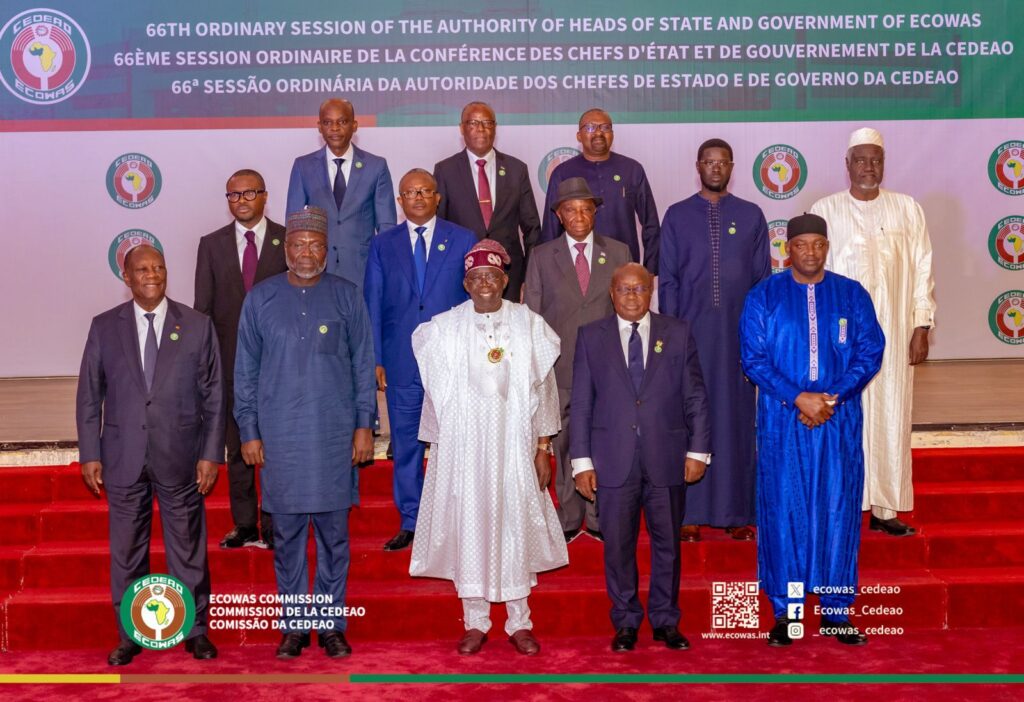
The high-stakes meeting, chaired by President Bola Ahmed Tinubu of Nigeria, tackled pressing regional challenges, including security, political transitions, and economic integration.
In a Communiques read by the President of the ECOWAS Commission, H E Dr Omar Alieu Touray, adopted key far reaching decisions.
The 66th Extra Ordinary Summit culminated in the adoption of a 69- paragraph communique which outlined critical resolutions aimed at steering the region toward stability, peace, democratic governance, integration and economic growth
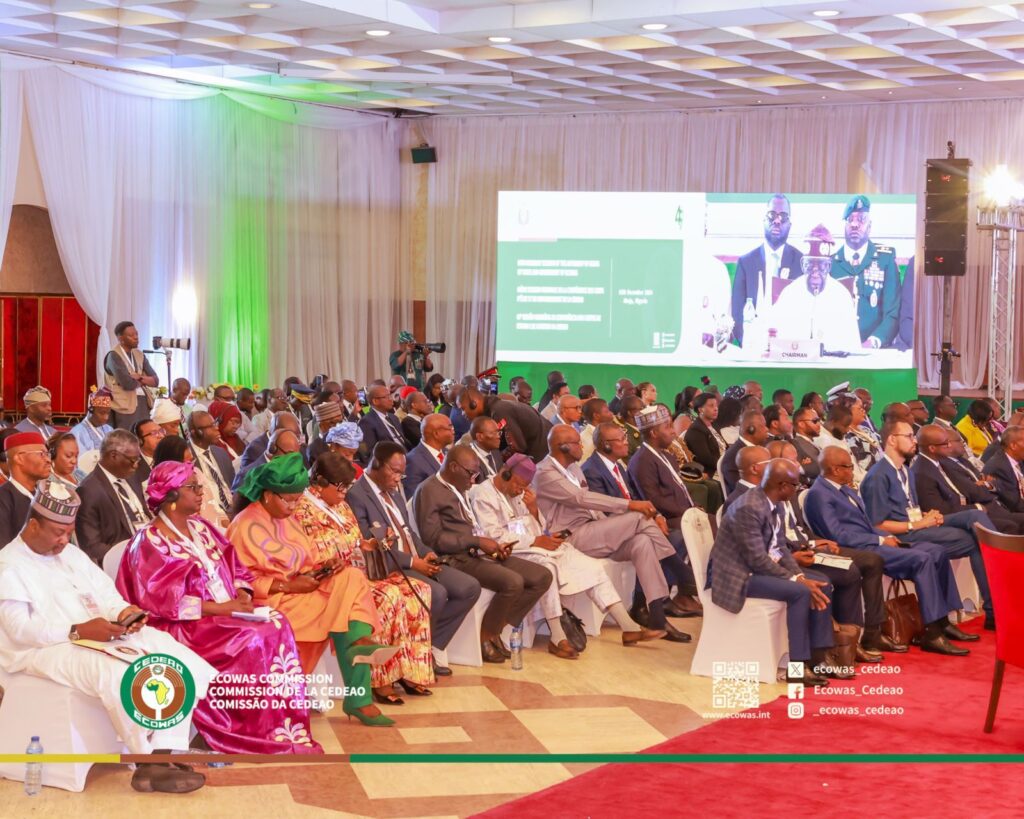
On its focus on Regional Security and Political Stability, the ECOWAS bloc reaffirmed its commitment to promoting peace and stability in the face of escalating security concerns in the region.
The communique highlighted the rising threat of terrorism, political instability, and unconstitutional changes of government in the region. Leaders emphasized the need for collective action to counter insurgent activities, particularly in Mali, Burkina Faso, and Niger.
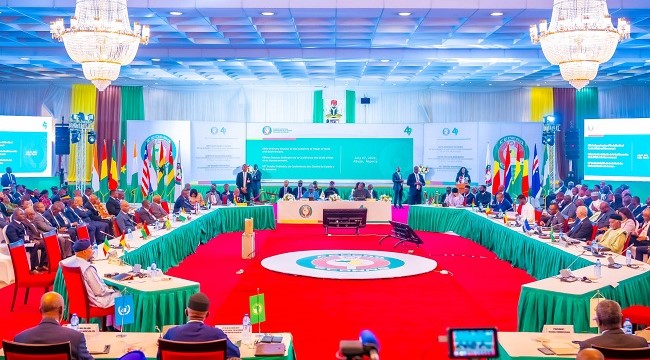
A major decision involved granting a six-month transitional window to the three nations, which had earlier declared their withdrawal from ECOWAS. This period, running from January 29 to July 29, 2025, was set to allow dialogue and potential reintegration. President Tinubu stressed that ECOWAS remained open to collaboration with these countries, emphasizing the bloc’s principle of fostering unity.
“We must protect the sovereignty of our member states while ensuring that democracy and good governance prevail across the region,” Tinubu stated in his opening remarks.
Also on economic Integration and development Projects, the
ECOWAS leaders also focused on strengthening the region’s economic foundation including specific mandate to it’s specialized institutions and the commission. The communique underscored the importance of implementing the ECOWAS Trade Liberalisation Scheme (ETLS) and the electronic certificate of origin. These measures are expected to simplify trade procedures, boost intra-regional trade, and drive economic integration.
The ambitious African Atlantic Gas Pipeline Project featured prominently in discussions. Once operational, the pipeline is set to enhance energy access across the region, spurring industrialization and economic growth. ECOWAS leaders also agreed to prioritize infrastructure development and harmonized trade policies to unlock the region’s economic potential.
Also noted in the Communique is the Humanitarian Crisis and Climate Challenges/ Early Warning response.
The communique shed light on the worsening humanitarian situation in parts of West Africa. Millions have been displaced due to violence and natural disasters exacerbated by climate change. Leaders pledged to enhance support for affected populations through coordinated humanitarian efforts and climate adaptation programs by the Commission and lauded the ECOWAS Commission for its efforts .
The Authority also called on the international community to support its initiatives in addressing these challenges. “We cannot tackle these issues in isolation. Regional and global partnerships are essential,” Tinubu noted.
Democracy and Governance
ECOWAS reiterated its zero-tolerance stance on unconstitutional changes of government. Leaders discussed ongoing efforts to restore constitutional order in member states where military coups had disrupted governance. The bloc emphasized the importance of credible elections, inclusive governance, and the rule of law.
In a bold move, ECOWAS leaders warned that further political instability could trigger stronger sanctions. They tasked the ECOWAS Commission with monitoring compliance with democratic principles and preparing mechanisms to enforce its decisions.
On the ECOWAS Single Currency, The Authority of Heads of States and Government through the Communique adopted the criteria proposed by the High-Level
issued at its 66th Ordinary Session.
Commission, in collaboration with the West African Monetary Agency and commended the High-Level Committee on Practical
steps for the selection of candidate Member States for the launch of
ECO or those which would join at a later stage. It instructs the
Arrangements for the launch of the ECO for the work accomplished and the significant consensus reached in the implementation of the directives to (WAMA), to ensure that these criteria are incorporated into the Protocol.
On Food Security and Nutrition, the Communique noted the
security and nutrition.
Development Programme(CAADP) Action Plan 2026-2035.
Systems;the Regional Rice Self-sufficiency Initiative and its road map technical and financial partners and urges Member States to work with the
Commission to ensure a swift implementation of the Regional Strategy.The Authority welcomes the strengthening of cooperation with
the Development of Livestock Farming and the Security of Pastoral
the ECOWAS Agricultural Policy (ECOWAP) within the framework of food security.Considering the critical role of agriculture in the socio-economic development of the ECOWAS region, The Authority welcomes the results achieved in the implementation of
development of ECOWAS Member States, the Authority direct the
together with Community Institutions towards the achievement of these
2025-2035; and domesticate the Comprehensive African Agriculture
initiatives for food security and nutrition
Partnerships and International Collaboration
The session welcomed key partners, including representatives from the United Nations and the African Union. H.E. Leonardo Santos Simão, Special Representative of the Secretary-General for West Africa and the Sahel (UNOWAS), and H.E. Moussa Faki Mahamat, Chairperson of the African Union Commission, reaffirmed their organizations’ support for ECOWAS initiatives.
The communique emphasized the need for collaboration in tackling regional issues, from combating extremism to fostering sustainable development.
Concluding Resolutions,
the 66th Ordinary Session ended with a robust call for action. The 69- paragraph communique encapsulated the bloc’s vision for a united, peaceful, and prosperous West Africa. As President Tinubu handed over the chairmanship to the next leader, he urged member states to remain steadfast in their commitments.
“Our strength lies in our unity. Together, we can overcome the challenges before us and build a brighter future for our people,” he concluded.
Looking Ahead
The outcomes of the 66th ECOWAS Ordinary Session signal a renewed determination to address the region’s most pressing issues. As the transitional period for Mali, Niger, and Burkina Faso unfolds, the region will watch closely to see whether the principles of solidarity and integration can prevail amidst challenges.
For West Africans, the communique represents more than resolutions—it’s a roadmap for progress, offering hope for a peaceful and prosperous future.




